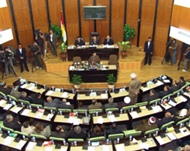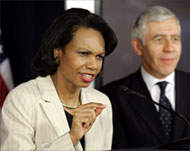Profile: Ibrahim al-Jaafari
A trained physician who has spent more than 20 years in exile, Ibrahim al-Jaafari was, until recently, virtually unknown outside Iraq.

In the three years since the US invasion, he has emerged as one of the key political figures in post-Saddam Iraq.
Born in Karbala in 1947 he joined the Dawa Islamiya (Islamic Call) Party, the oldest Shia party in Iraq, in 1968 while attending medical school.
The Dawa fought a bloody campaign against Saddam Hussein, but when that was ultimately crushed in 1980 al-Jaafari was forced to flee the country – first to Iran, and then to London where he became the party’s spokesman.
He did not return to Iraq until the fall of the Saddam regime in 2003.
Just over a year later, al-Jaafari was made one of two vice- presidents in the US-appointed interim government.
In a 2004 opinion poll, he came as the third most popular figure in Iraq, after Ayatollah Ali al-Sistani, the leading Shia cleric in Iraq, and Muqtada al-Sadr, another Shia cleric.
Also in 2004, al-Jaafari brought the Dawa party into the United Iraqi Alliance, UIA, a Shia-led political coalition and became an important member of the bloc.
When the UIA won Iraq’s general elections in January 2005, they chose al-Jaafari as their candidate for prime minister.
With the backing of the three-man presidency council, al-Jaafari became the prime minister of the Iraqi Transitional Government on April 7, 2005.
Al-Jaafari’s government oversaw the drafting of a new constitution after months of wrangling, but differences with the Kurds soon emerged.
 |
|
The Kurds accuse al-Jaafari of |
Kurdish leaders were not satisfied with al-Jaafari’s performance for unilaterally taking decisions, violating accords signed between the Kurdistan alliance and the UIA before the setting up of the government.
The Kurds also accused al-Jaafari of failing to improve the country’s crumbling infrastructure, or dealing effectively with security.
In the national election of December 2005, the UIA once again won the majority of the votes. Under the new Iraqi constitution, the alliance gets to choose the prime minister.
UIA members voted for al-Jaafari to be their candidate to lead the next Iraqi cabinet and the country’s first permanent post-Saddam government.
But al-Jaafari’s nomination was met by strong resistance from the Kurds and the Sunni Arabs.
The UIA can form a unity government only with the backing of the Kurds and the Sunni Arabs because the Shia bloc falls short of an overall majority in the parliament.
But the Kurds and the Sunni Arabs agree that Iraq is in need of a government of national unity and accuse al-Jaafari of running a sectarian-tinged government.
They also accuse him of collaborating with Muqtada al-Sadr, who leads a powerful Shia militia and controls a bloc of 32 seats in the parliament.
 |
|
The US and Britain are urging |
Meanwhile the US and Britain have also urged al-Jaafari to step aside to break the deadlock over the formation of a government, believing that the political vacuum is fuelling ongoing violence.
Some UIA senior members have joined the Kurds and the Sunnis and openly called on al-Jaafari to step down.
The Fadhila party, one of the UIA members, has stepped up pressure on the alliance by saying it was ready to offer a candidate to replace al-Jaafari if the Shia bloc failed to pass his candidacy.
Al-Jaafari says he will not step aside and give up his nomination. He continues to have the support of his own Dawa party, and the movement of al-Sadr. He says he is rejecting calls to give up “to protect democracy in Iraq”.
Al-Jaafari also cautioned against taking his case to the parliament, which must approve the new prime minister and his cabinet by a majority vote.
Nevertheless, pressure is mounting, even from within his own Shia political alliance.
It is not clear what mechanism might be used to choose a new nominee nor whom it might be.